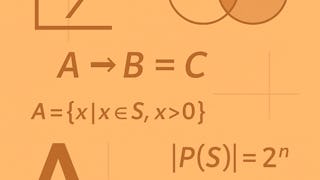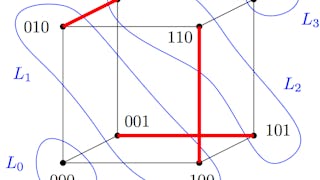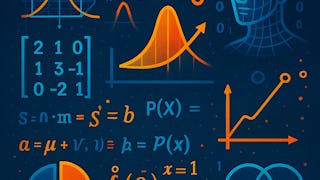- Browse
- Discrete Mathematics
Discrete Mathematics Courses
Discrete Mathematics courses can help you learn logic, set theory, combinatorics, and graph theory. You can build skills in problem-solving, algorithm design, and mathematical reasoning, which are valuable in computer science and cryptography. Many courses introduce tools such as MATLAB or Python for implementing algorithms and visualizing mathematical concepts, allowing you to see how these skills apply in areas like data analysis and network design.
Popular Discrete Mathematics Courses and Certifications
 Status: Free TrialFree TrialU
Status: Free TrialFree TrialUUniversity of California San Diego
Skills you'll gain: Graph Theory, Logical Reasoning, Combinatorics, Computational Logic, Deductive Reasoning, Cryptography, Probability, Computational Thinking, Encryption, Probability Distribution, Network Analysis, Public Key Cryptography Standards (PKCS), Theoretical Computer Science, Bayesian Statistics, Python Programming, Data Structures, Cybersecurity, Algorithms, Arithmetic, Visualization (Computer Graphics)
4.5·Rating, 4.5 out of 5 stars3.7K reviewsBeginner · Specialization · 3 - 6 Months
 Status: NewNewStatus: Free TrialFree TrialB
Status: NewNewStatus: Free TrialFree TrialBBirla Institute of Technology & Science, Pilani
Skills you'll gain: Theoretical Computer Science, Applied Mathematics, Algorithms, Cryptography, Relational Databases, Data Management
Beginner · Course · 1 - 3 Months
 Status: PreviewPreviewS
Status: PreviewPreviewSShanghai Jiao Tong University
Skills you'll gain: Combinatorics, Graph Theory, Theoretical Computer Science, Mathematical Theory & Analysis, Advanced Mathematics, Network Analysis, Computational Thinking, Algorithms, Data Structures, Computer Science
3.3·Rating, 3.3 out of 5 stars202 reviewsIntermediate · Course · 1 - 3 Months
 Status: PreviewPreviewS
Status: PreviewPreviewSStanford University
Skills you'll gain: Mathematical Theory & Analysis, Mathematics and Mathematical Modeling, Calculus, Deductive Reasoning, Logical Reasoning
4.8·Rating, 4.8 out of 5 stars3K reviewsIntermediate · Course · 1 - 3 Months
 Status: PreviewPreviewP
Status: PreviewPreviewPPeking University
Skills you'll gain: Theoretical Computer Science, Graph Theory, Computational Logic, Geospatial Information and Technology, Spatial Data Analysis, Computational Thinking, Logical Reasoning, Computer Science, Algorithms, Algebra
4.7·Rating, 4.7 out of 5 stars281 reviewsBeginner · Course · 3 - 6 Months
 Status: NewNewStatus: Free TrialFree TrialB
Status: NewNewStatus: Free TrialFree TrialBBirla Institute of Technology & Science, Pilani
Skills you'll gain: Data Analysis, Computational Logic, Engineering Calculations, Trigonometry, Linear Algebra, Engineering Analysis, Logical Reasoning, Deductive Reasoning, Probability & Statistics, Statistical Analysis, Calculus, Analytical Skills, Bayesian Statistics, Differential Equations, Programming Principles, Statistical Inference, Theoretical Computer Science, Numerical Analysis, Descriptive Analytics, Applied Mathematics
4.6·Rating, 4.6 out of 5 stars191 reviewsBeginner · Specialization · 3 - 6 Months
What brings you to Coursera today?
 Status: Free TrialFree TrialT
Status: Free TrialFree TrialTThe Hong Kong University of Science and Technology
Skills you'll gain: Differential Equations, Linear Algebra, Matlab, Engineering Calculations, Engineering Analysis, Numerical Analysis, Finite Element Methods, Integral Calculus, Mathematical Software, Mechanical Engineering, Calculus, electromagnetics, Algebra, Applied Mathematics, Mathematical Modeling, Engineering, Advanced Mathematics, Geometry, Simulation and Simulation Software, Mechanics
4.8·Rating, 4.8 out of 5 stars7.7K reviewsBeginner · Specialization · 3 - 6 Months
 Status: Free TrialFree TrialJ
Status: Free TrialFree TrialJJohns Hopkins University
Skills you'll gain: Linear Algebra, Algebra, Applied Mathematics, Advanced Mathematics, Artificial Intelligence and Machine Learning (AI/ML), Mathematical Modeling, Engineering Analysis, Mathematical Theory & Analysis, Numerical Analysis, Geometry, Data Transformation, Applied Machine Learning, Dimensionality Reduction, Markov Model, Probability
4.7·Rating, 4.7 out of 5 stars222 reviewsBeginner · Specialization · 3 - 6 Months
 Status: Free TrialFree TrialI
Status: Free TrialFree TrialIImperial College London
Skills you'll gain: Linear Algebra, Dimensionality Reduction, NumPy, Regression Analysis, Calculus, Applied Mathematics, Data Preprocessing, Unsupervised Learning, Feature Engineering, Machine Learning Algorithms, Jupyter, Advanced Mathematics, Statistics, Artificial Neural Networks, Algorithms, Mathematical Modeling, Python Programming, Derivatives
4.6·Rating, 4.6 out of 5 stars15K reviewsBeginner · Specialization · 3 - 6 Months
 Status: Free TrialFree TrialD
Status: Free TrialFree TrialDDeepLearning.AI
Skills you'll gain: Descriptive Statistics, Bayesian Statistics, Statistical Hypothesis Testing, Probability & Statistics, Sampling (Statistics), Probability Distribution, Linear Algebra, Statistical Inference, A/B Testing, Statistical Analysis, Applied Mathematics, NumPy, Probability, Calculus, Dimensionality Reduction, Numerical Analysis, Machine Learning Algorithms, Data Preprocessing, Machine Learning, Machine Learning Methods
4.6·Rating, 4.6 out of 5 stars3.1K reviewsIntermediate · Specialization · 1 - 3 Months
 Status: Free TrialFree TrialU
Status: Free TrialFree TrialUUniversity of California San Diego
Skills you'll gain: Logical Reasoning, Computational Logic, Deductive Reasoning, Computational Thinking, Theoretical Computer Science, Combinatorics, Algorithms, Python Programming, Computer Science, Program Development
4.4·Rating, 4.4 out of 5 stars2.3K reviewsBeginner · Course · 1 - 3 Months
 Status: Free TrialFree TrialU
Status: Free TrialFree TrialUUniversity of London
Skills you'll gain: Arithmetic, Applied Mathematics, Computer Science, Computational Thinking, General Mathematics, Mathematical Modeling, Algebra, Cryptography, Systems Of Measurement
4.2·Rating, 4.2 out of 5 stars274 reviewsBeginner · Course · 1 - 4 Weeks
Searches related to discrete mathematics
In summary, here are 10 of our most popular discrete mathematics courses
- Introduction to Discrete Mathematics for Computer Science: University of California San Diego
- Discrete Mathematics for Computer Science and Engineering: Birla Institute of Technology & Science, Pilani
- Discrete Mathematics: Shanghai Jiao Tong University
- Introduction to Mathematical Thinking: Stanford University
- 离散数学概论 Discrete Mathematics Generality: Peking University
- Mathematics for Engineering: Birla Institute of Technology & Science, Pilani
- Mathematics for Engineers: The Hong Kong University of Science and Technology
- Linear Algebra from Elementary to Advanced: Johns Hopkins University
- Mathematics for Machine Learning: Imperial College London
- Mathematics for Machine Learning and Data Science: DeepLearning.AI
Skills you can learn in Probability And Statistics
Frequently Asked Questions about Discrete Mathematics
Discrete mathematics is a branch of mathematics that deals with discrete elements that use algebra and arithmetic. It encompasses a variety of topics such as logic, set theory, graph theory, and combinatorics. Discrete mathematics is crucial because it provides the foundational concepts necessary for computer science, cryptography, and algorithm design. Understanding these principles helps in developing efficient algorithms and data structures, which are essential in programming and software development.
A background in discrete mathematics can lead to various career opportunities. Positions such as data analyst, software developer, systems analyst, and operations researcher often require knowledge of discrete mathematics. Additionally, roles in academia and research, particularly in fields like computer science and engineering, value this expertise. As technology continues to advance, the demand for professionals skilled in discrete mathematics is likely to grow.
To learn discrete mathematics effectively, you should focus on several key skills. These include logical reasoning, problem-solving, and analytical thinking. Familiarity with mathematical proofs and the ability to work with algorithms and data structures are also important. Additionally, programming skills can enhance your understanding of how discrete mathematics applies in real-world scenarios, particularly in computer science.
There are several excellent online courses available for studying discrete mathematics. Notable options include the Discrete Mathematics course, which covers essential topics and applications. The Introduction to Discrete Mathematics for Computer Science Specialization is another comprehensive choice, providing a deeper dive into the subject tailored for aspiring computer scientists.
Yes. You can start learning discrete mathematics on Coursera for free in two ways:
- Preview the first module of many discrete mathematics courses at no cost. This includes video lessons, readings, graded assignments, and Coursera Coach (where available).
- Start a 7-day free trial for Specializations or Coursera Plus. This gives you full access to all course content across eligible programs within the timeframe of your trial.
If you want to keep learning, earn a certificate in discrete mathematics, or unlock full course access after the preview or trial, you can upgrade or apply for financial aid.
To learn discrete mathematics, start by identifying your learning goals and preferred study methods. You can enroll in online courses, such as the Discrete Mathematics for Computer Science and Engineering course, which provides structured content. Supplement your learning with textbooks, practice problems, and online forums to discuss concepts with peers. Consistent practice and application of concepts will reinforce your understanding.
Typical topics covered in discrete mathematics courses include logic, set theory, functions, relations, combinatorics, graph theory, and algorithms. These subjects form the backbone of many computer science applications, enabling learners to understand complex systems and solve problems effectively. Courses often emphasize both theoretical concepts and practical applications, ensuring a well-rounded understanding.
For training and upskilling employees, courses like the Introduction to Discrete Mathematics for Computer Science Specialization are highly beneficial. They provide a comprehensive overview of discrete mathematics tailored for professionals in tech and engineering fields. Such courses can enhance problem-solving skills and analytical thinking, making them valuable for workforce development.










